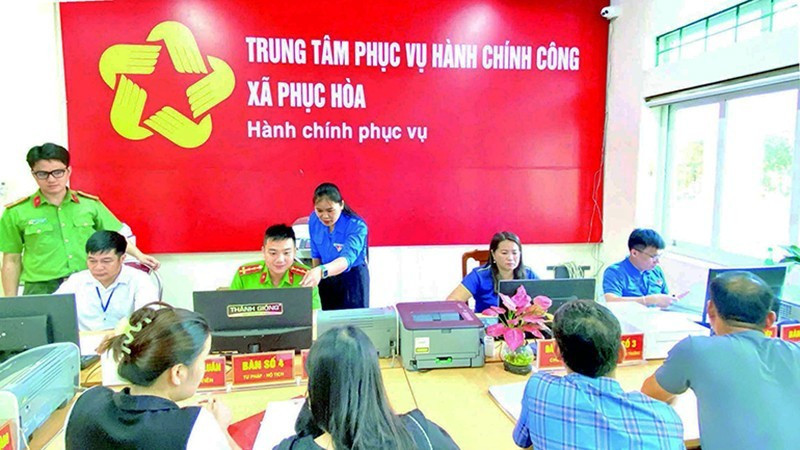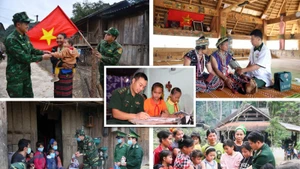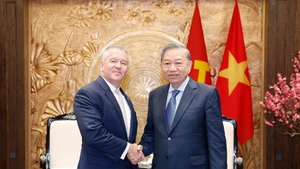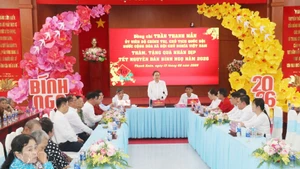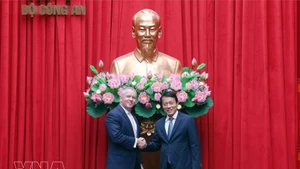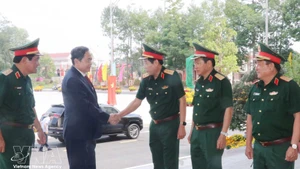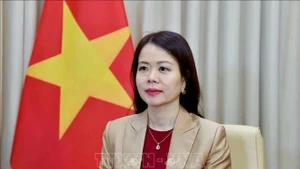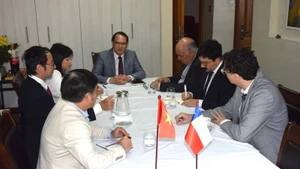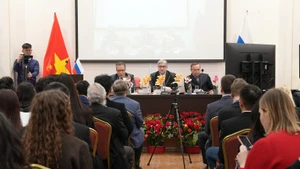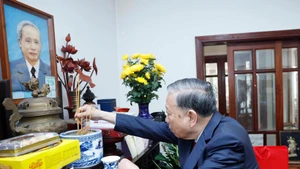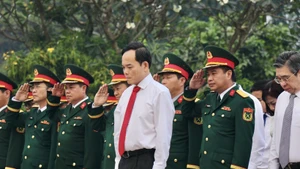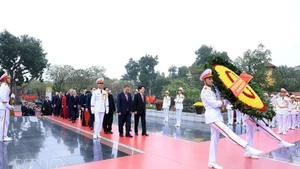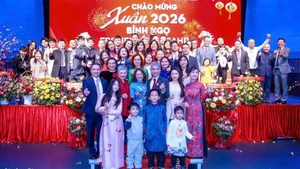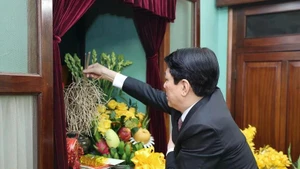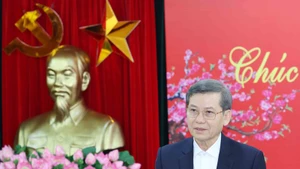However, in the first days of July, all difficulties in the border areas are temporarily calming down, giving way to a completely new experience for both the government and the people, businesses...
Since July 1, along with the whole country, the two-tier local government model has officially come into operation in Cao Bang, blowing a new wind through the young public administration service centers, which are still facing many difficulties in the border areas.
Transforming to welcome the “new flow”
In Tan Giang ward, one of the three new wards in Cao Bang province, the working atmosphere on the first day of the operation of the two-tier local government is quite exciting.
From early morning, the ward staff and civil servants were present in full, ready to support people and businesses... What is noteworthy is the proactive and flexible coordination of relevant units, handling situations arising on the spot, and resolving initial difficulties quite effectively.
Trinh Sy Tai, Secretary of the Tan Giang Ward Party Committee, said that during the trial period, the Party Committee and the ward government closely followed the activities of staff and civil servants; directly inspected and directed at the Public Administration Service Centre.
On the first day of official operation, the centre directly received 28 applications, 6 applications via online public services. Although there were still 22 applications that did not meet the conditions for acceptance and needed guidance and advice - an inevitable initial difficulty when people were not familiar with the new process - this also showed that the interaction and actual demand for administrative services had increased significantly.
From the bustling Tan Giang ward, the spirit of active work spreads to the Phuc Hoa Commune Public Administration Service Centre - a newly established border commune from the former Quang Hoa district, where the overlapping mountain ranges connect residential areas, towns to high valleys, border roads...
Ha Van Truong, a Tay ethnic, living in Bien Hoa hamlet, travelled 15km of bumpy mountain roads through Kenh Cang pass to reach the commune centre to handle land procedures. His life is closely linked to the fields, every time he needs to do administrative procedures, he has to mentally prepare for the arduous trip down the mountain.
“I live in a border hamlet, traffic is very difficult. But the hardship of traveling is not as bad as before, every time I went to do administrative procedures, I finished at the commune and then went down to the district. Going back and forth, it took 2 to 3 days and still not sure if I finished the job...”.
But this time he was surprised. In just one session, Ha Van Truong’s case was guided and resolved by the staff of the People’s Committee of Phuc Hoa commune. He was also impressed with the space in the waiting area, which was arranged with clean and comfortable chairs.
The Commune Public Administration Service Centre publicly posts a set of administrative procedure guidelines to help people easily receive them; provides a hotline number ready to support, guide, and answer feedback and recommendations from individuals and organisations.
Having been worried about handling business procedures when implementing the new local government model, Nong Van Thuyet, Chairman of the Board of Directors of Cao Bang Sugarcane Joint Stock Company, thought differently: “Previously, businesses, although located in the commune, had to go to the district or even the province to ask for many things, but now they are under the authority of the commune, can be supported to handle quickly, reduce time, and increase efficiency”.
With efforts to overcome difficulties, since the official operation date, the People’s Committee of Phuc Hoa commune has had no overdue records, no feedback or recommendations from people related to handling administrative procedures.
Arousing people’s trust
In fact, the transition to a two-tier local government model is not without challenges that need to be overcome. Proactively predicting the difficulties that will be encountered and being ready to overcome the arising problems, localities in Cao Bang are quite optimistic about being able to handle the situation well.
Tan Giang Ward Party Secretary Trinh Sy Tai said that the most obvious difficulty is the arrangement of seating positions, Party Committee headquarters, Ward People's Committee and socio-political organisations.
The ward has 4 workplaces but they are located far apart, even having to reuse the cultural house for public administrative work.
To overcome and make efforts to operate, Tan Giang Ward has arranged for officials from the city level (previously) to transfer back and former commune-level officials to directly hold appropriate positions to coordinate in supporting the people, ensuring the effective transfer of experience and knowledge in administrative handling.
The ward also established a working group to go to difficult areas to guide and resolve procedures for people.
“At the Ward Public Administration Service Centre, due to the design of the old cultural house, the centre is located on the 2nd floor. However, we proactively arranged an office on the 1st floor with full facilities, as well as bells, cameras, etc. to best serve vulnerable groups such as the elderly and the disabled,” said comrade Trinh Sy Tai.
Regarding the shortcomings in reusing old offices, Tan Giang ward tries to arrange them appropriately according to the Party Central Committee’s direction, not to waste them and tries to use them all while still achieving work efficiency.
In border communes such as Phuc Hoa, Be Van Dan, Doc Lap, Quang Uyen, Hanh Phuc, etc., the biggest difficulty is that the data is not synchronized and the automatic result return system has not been activated.
Party Secretary of Phuc Hoa Commune, Vu Anh Tuan shared: “Currently, some administrative procedures need time to be adjusted to suit the new organizational structure. The facilities are degraded, the working equipment in some departments and offices is not guaranteed, affecting the efficiency and progress of work”.
However, these issues are not surprising, because remote communes operating under the new model all have larger areas, larger populations, and higher requirements in organizing the apparatus, operating and serving the people.
Tuan said that the most important thing is still the efforts of the collective of cadres and civil servants, needing to quickly catch up and effectively overcome the shortcomings in the new work process to ensure smooth service for the people.
Vu Anh Tuan is a cadre transferred from the province to become Chairman of the People’s Committee of old Quang Hoa district, now Secretary of the Party Committee of Phuc Hoa commune. Previously, he could return home once a week, but since the commune started operating, he has not returned home for a single day.
This is also a common story of many cadres and civil servants of Phuc Hoa commune when they have to leave home to build a new commune government. With high determination and solidarity of cadres and civil servants of the commune, the entire political system with the spirit of “running and lining up at the same time”, strives to ensure effective operations right from the first days of operating the 2-level government.
Chairman of the People’s Committee of Phuc Hoa commune Dam Dinh Dao, also a reinforced cadre, emphasised: “Each commune cadre is required to accelerate professional improvement, master professional skills and proactively apply digital transformation. From there, enhance the ability to advise, receive and resolve administrative procedures for people in the commune, most of whom are ethnic minorities”.
Obviously, the operation of the new government model is a major transformation not only in terms of organisation but also in terms of awareness, thinking and action of the entire political system nationwide.
The movements from the grassroots contribute to clearly demonstrating the spirit of innovation and the determination to overcome initial difficulties to increasingly serve the people better.
As in the letter of encouragement to 56 chairpersons of the People’s Committees of new communes and wards before the operation of the 2-tier local government, Le Hai Hoa, Chairman of the People’s Committee of Cao Bang province wrote: “We cannot wait for the transformation from the top down. We must start from the commune. From the new spirit of service. From the actual management capacity. From the changes in each cadre and civil servant. And especially - from the trust that we arouse in the people”.
